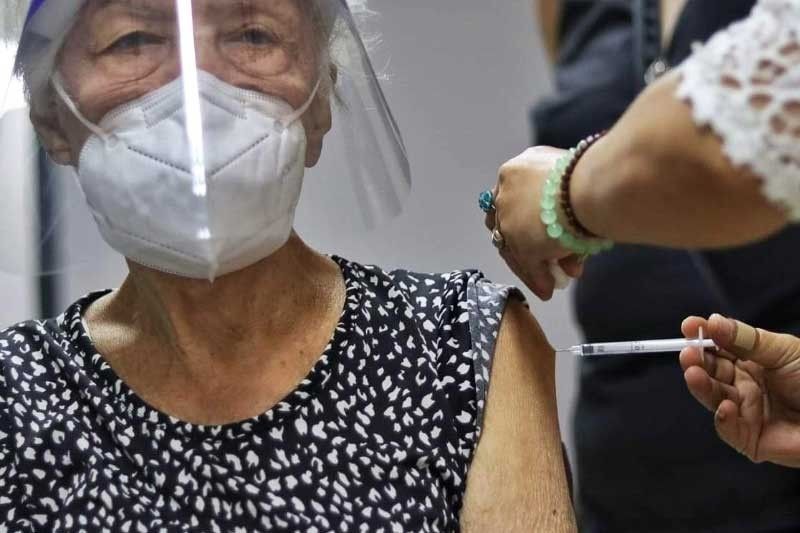Vaccine ‘express lane’ opened for A1 to A3

MANILA, Philippines — An “express lane” for individuals included in the A1 to A3 priority sectors is in place, the Metropolitan Manila Development Authority (MMDA) said yesterday, as the national vaccination program further ramps up.
In an interview aired over dzBB yesterday morning, MMDA Public Safety Office director III Vic Trinidad said medical frontliners, senior citizens and individuals with comorbidities can get on the fast lane for vaccination against COVID-19.
Trinidad noted the low percentage of vaccinated individuals, especially among seniors.
“The A1 to A3 (sectors) have an express lane. Let us not forget that,” he said in Filipino.
He also said that the proposal to do a house-to-house vaccination of senior citizens was floated, although some Metro Manila cities have started it.
“Among the senior citizens, their slots have been opened for months, but it is not yet full. That is why the government said not to forget the A1 to A3 sectors because they are priority sectors,” Trinidad said.
He also voiced confidence that if the elderly are inoculated in the comfort of their homes, vaccine confidence would rise.
The Department of Health (DOH) yesterday stressed the need to aggressively find and inoculate highly vulnerable seniors.
“We need to find these elderly people so that we can immediately inoculate them and prevent hospitalization and death from this age group,” Health Undersecretary Leopoldo Vega said in a radio interview.
“This is a big population group that is highly vulnerable, and we are merely in the 12 percent coverage,” Vega noted.
At this time, Vega said, only 1,174,191 senior citizens received the first dose of SARS-CoV-2 vaccines, and 195,952 their second doses. Based on DOH data, there are 9.4 million seniors in the A2 priority group.
“We are still far off from our target so we really need to be aggressive in finding them and inoculating them,” Vega pointed out.
The issue was raised as the national government looked into starting the vaccination of the A4 sector, which includes essential economic frontliners.
Trinidad said Metro Manila mayors supported the definition of the National Economic and Development Authority of those included in A4.
Vega said workers aged 40 and above must also be given priority under A4.
“Those who are working and are more than 40 years old, should be given priority among the A4 sector. This is because the older ones are more vulnerable to COVID-19,” he explained.
The country aims to achieve herd immunity within the year, as more COVID-19 vaccine doses are expected to arrive in the coming months.
‘Ease up on vaccinated citizens’
According to one congressman, in order to pump prime the economy, the Inter-Agency Task Force for the Management of Emerging Infectious Diseases (IATF) should also consider easing restrictions on vaccinated citizens, including the elderly, by way of “exempting” them from strict lockdowns, social distancing and health protocols.
“With all these vaccinations going on, I think that the government should try to review our existing health and safety protocols and consider easing up its rules on people who have already been vaccinated,” Rep. Ronnie Ong suggested.
“We have to jumpstart our economy and allow our businesses to recover their losses,” the congressman from party-list Ang Probinsiyano stressed.
“This is to allow businesses that were hardest hit by the pandemic to bounce back,” he said.
Ong said that business establishments such as restaurants, malls, hotels, resorts and those in the tourism sector should also relax restrictions for people already deemed protected from COVID-19.
He said with the increasing number of people who have been vaccinated, the IATF must update its prevailing guidelines on social distancing and health protocols, including the capacity requirement on malls, restaurants, hotels, resorts and other establishments. For example, the IATF can start allowing dine-in and allow 100 percent capacity in restaurants for customers and guests who are fully vaccinated. They can set aside areas exclusive for such customers.
Ong noted, however, that face masks could still be required but the face shield can be discarded.
“At the same time, we will be able to entice more people to get themselves vaccinated. Even those who are having second thoughts to be vaccinated would definitely get a jab if they want to enjoy the same privileges as those who were already vaccinated,” he added.
‘Waterfalls’ policy
The IATF should immediately implement a “waterfalls” policy to speed up the vaccination amid reports of lingering hesitancy among Filipinos to get jabs against COVID-19, Sen. Francis Tolentino said yesterday.
The senator explained this policy means the IATF should not wait until it completes vaccination of those in the A1 category (health workers); A2 (elderly); and A3 (persons with comorbidities), and immediately start with the inoculation of those in the A4 group or frontline workers in essential sectors, including members of media and uniformed personnel.
He said IATF, through local government units and other entities authorized to conduct vaccinations, should re-allot the reserved vaccines for those who belong to A2 and A3 categories who refused to get their jabs.
“There is what is called the ‘waterfalls’ policy, this cascades downwards, if those in the A3 don’t want it (vaccines) then we immediately give them to A4; if A4 does not want it, give it to A5 (indigent); if A5 doesn’t want it, give it to B1 (teachers and social workers). If that happens… we can use up all our vaccines,” Tolentino told dzBB.
He cited some cases in vaccination centers where there are leftover doses that can be immediately jabbed into some policemen – who are in the A4 category – guarding the injection process.
Tolentino estimated that the country’s vaccines are down to 107,000 doses, which is good for 53,000 people.
He said vaccine hesitancy, as shown by recent polls, should not be a major concern as of now, even as the government and other stakeholders continue to intensify and expand their information campaign to encourage Filipinos to get vaccinated.
The senator said the country’s vaccine supply is so low that it is only good for a small percentage of those willing to be vaccinated, so the issue of hesitancy would only matter if the supply of doses is sufficient to inoculate even those who are wary of the jabs.
Members of the Armed Forces, Philippine National Police and the Coast Guard have yet to receive a single vaccine dose as they fall in the A4 category – even if they have also been at the forefront of the government’s fight against COVID-19.
Tolentino believes it is not the vaccine brand that causes the hesitation, but the lack of proper approach to educate Filipinos. – Mayen Jaymalin, Delon Porcalla, Paolo Romero
- Latest
- Trending

























